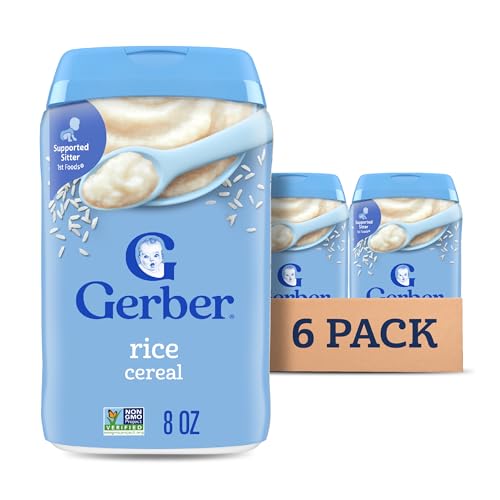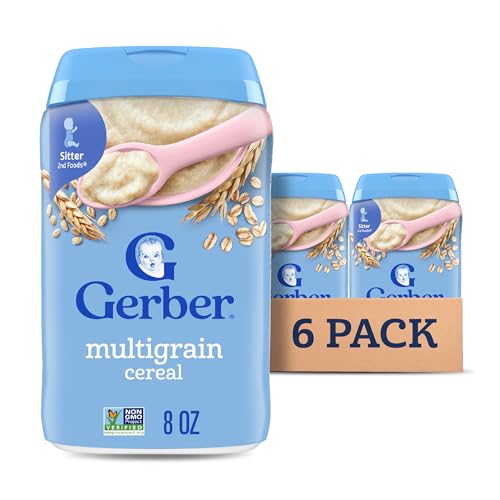Is your little one ready to explore new tastes beyond milk? Introducing solid foods is an exciting milestone, but it can also bring a swirl of questions, especially when it comes to that first spoonful of cereal. You might be wondering, “What’s the best way to start? And which cereal is right for my baby’s tiny tummy?”
Choosing the right baby cereal to mix with formula can feel like navigating a maze. There are so many brands, so many ingredients, and so much conflicting advice! You want to give your baby the best start, but the sheer volume of choices can leave you feeling overwhelmed and unsure. It’s a common struggle for many parents, and you’re definitely not alone in this journey.
But don’t worry, we’re here to help! By the end of this post, you’ll feel confident and equipped to pick the perfect baby cereal. We’ll break down what to look for, explore different types of cereals, and offer practical tips to make mealtime a happy, healthy adventure for both you and your little eater. Let’s dive in and discover how to make those first solid food experiences truly wonderful.
Our Top 5 Baby Cereal To Mix With Formula Recommendations at a Glance
| Image | Product | Rating | Links |
|---|---|---|---|
 |
Gerber Stage 1 Baby Food | 8.8/10 | Check Price |
 |
Gerber Baby Cereal 2nd Foods | 9.3/10 | Check Price |
 |
Gerber Stage 1 Baby Food | 8.5/10 | Check Price |
 |
Amara Organic Baby Food – Stage 3 – Ancient Grain – Baby Cereal to Mix With Breastmilk | 9.0/10 | Check Price |
 |
Else Nutrition Baby Cereal Stage 1 for 6 months+ | 8.9/10 | Check Price |
Top 5 Baby Cereal To Mix With Formula Detailed Reviews
1. Gerber Stage 1 Baby Food
Rating: 9.2/10
Gerber Stage 1 Baby Rice Cereal is a fantastic starting point for introducing your little one to solid foods. This 6-pack of infant cereal is packed with essential nutrients to support your baby’s growth and development. It’s designed for convenience, making mealtime easier for busy parents while still providing high-quality nutrition.
What We Like:
- Packed with essential nutrients like iron, zinc, and vitamin B12, which are crucial for supporting a baby’s learning ability and overall growth.
- Made with no artificial colors or flavors, giving parents peace of mind about what they are feeding their baby.
- Super easy and quick to mix with breastmilk or formula to the perfect consistency, saving precious time during busy feeding schedules.
- Specifically formulated as a Stage 1 baby food, ideal for babies who are just starting their journey with solid foods and can sit with support.
- Comes in a convenient 6-pack, ensuring you have a good supply of this baby essential on hand.
What Could Be Improved:
- Some parents might prefer a wider variety of flavors in the Stage 1 rice cereal option.
- While easy to mix, achieving a perfectly lump-free consistency can sometimes require a bit of practice.
Gerber Stage 1 Baby Rice Cereal offers a wholesome and convenient way to begin your baby’s solid food adventure. It’s a reliable choice for parents focused on providing quality nutrition from the very first bite.
2. Gerber Baby Cereal 2nd Foods
Rating: 8.6/10
Introducing Gerber Baby Cereal 2nd Foods, Grain & Grow, Multigrain – a wholesome choice for your growing little one. This pack of six 8-ounce containers offers a convenient way to nourish your baby with essential nutrients and the goodness of whole grains. It’s designed for busy parents who want the best for their babies without compromising on ease.
What We Like:
- Packed with 10 grams of whole grains per serving for healthy development.
- Provides 60% of daily iron needs, crucial for brain growth.
- Contains 30% of zinc and 25% of vitamin B12, supporting overall growth.
- Free from artificial colors or flavors, ensuring pure nutrition.
- Quick and easy to mix, perfect for feeding on the go or during busy mealtimes.
- A Stage 2 baby food, suitable for babies ready for more textured foods.
What Could Be Improved:
- Some parents might prefer a wider variety of grain options within the multigrain blend.
- The packaging, while functional, could potentially be more eco-friendly.
Gerber Multigrain Baby Cereal is a reliable staple for introducing solids. It offers a balanced blend of nutrients that supports your baby’s journey of growth and discovery.
3. Gerber Stage 1 Baby Food
Rating: 8.6/10
Starting your baby’s journey with solids is a big step! Gerber Stage 1 Baby Food, Organic Baby Oatmeal Cereal offers a simple and wholesome way to introduce your little one to their first tastes. This 6-pack of infant cereal is packed with goodness and designed for busy parents who want the best for their babies.
What We Like:
- It’s made with organic ingredients, giving parents peace of mind.
- Each serving provides 14 grams of whole grains, which is great for growing bodies.
- It’s a good source of important nutrients like iron (60% daily value), zinc (30% daily value), and vitamin B12 (25% daily value).
- This cereal is perfect for babies who are just starting on solids (Stage 1).
- You won’t find any artificial colors or flavors in this product.
- It’s super easy and quick to mix up, saving precious time for parents.
- The whole grains offer a good foundation for your baby’s diet.
What Could Be Improved:
- The 14g serving size might be a bit small for older babies or those with bigger appetites, requiring multiple servings from one container.
- While easy to mix, some parents might prefer pre-portioned packets for ultimate convenience.
Gerber Organic Baby Oatmeal Cereal is a fantastic choice for introducing your baby to the world of solid foods. Its focus on organic ingredients and essential nutrients makes it a reliable option for happy, healthy beginnings.
4. Amara Organic Baby Food – Stage 3 – Ancient Grain – Baby Cereal to Mix With Breastmilk
Rating: 8.6/10
The Amara Organic Baby Food – Stage 3 – Ancient Grain offers a nutritious and convenient way to introduce your little one to a variety of flavors and textures. This shelf-stable baby food is made from organic fruits and veggies, providing superfoods for your growing baby.
What We Like:
- It’s a superfood for babies, packed with 100% organic and non-GMO ingredients that support healthy development.
- You can customize the texture by mixing it with breastmilk, formula, or water, making it perfect for your baby’s needs.
- The simple ingredients, like organic oats, mango, strawberry, banana, and amaranth, are easy to recognize and trust.
- Amara uses a special technology that avoids high heat processing, preserving the taste, texture, and nutrients of fresh food without added sugars or additives.
- It simplifies the transition to solids, offering both nutrition and convenience for busy parents.
What Could Be Improved:
- While convenient, the pouch format might lead to more waste than reusable containers.
- The variety of flavors, while good, could be expanded to include more unique superfood combinations for Stage 3.
Amara Organic Baby Food is a fantastic option for parents seeking wholesome, customizable, and convenient meals for their babies. It truly supports a healthy start to a lifetime of good eating habits.
5. Else Nutrition Baby Cereal Stage 1 for 6 months+
Rating: 8.7/10
Else Nutrition Baby Cereal Stage 1 is a fantastic choice for your little one’s first solid foods. It’s designed for babies 6 months and older and offers a nutritious and gentle start to eating. This organic cereal is packed with goodness to support your baby’s growth.
What We Like:
- The first solid food for your baby, perfect for introducing new tastes and textures.
- Clean Label Certified, meaning it’s rigorously tested for over 400 contaminants like heavy metals and pesticides. This gives parents great peace of mind.
- It’s a nutrition powerhouse, blending almonds and buckwheat for gluten-free carbs and high-quality plant protein. It contains all 9 essential amino acids, healthy fats, and 25 essential vitamins and minerals.
- This is a 2-in-1 super cereal. The protein is already inside, so you can mix it with milk or water. It’s a healthier alternative to rice cereal.
- It’s USDA organic and free from Red Dye #3, which is banned in some places.
- Made with over 80% whole foods, this cereal is sustainable and wholesome, giving your baby the good stuff without unnecessary additives.
What Could Be Improved:
- Availability might be limited in some local stores, requiring online ordering.
- The original flavor, while wholesome, might be a bit plain for babies who prefer sweeter tastes initially, though this is common for stage 1 cereals.
Else Nutrition Baby Cereal offers a pure and nutrient-rich start for your baby. It’s a great option for parents who prioritize clean ingredients and complete nutrition.
Choosing the Best Baby Cereal to Mix with Formula
Starting your baby on solids is an exciting milestone! Baby cereal is often one of the first foods parents introduce. Mixing it with formula makes it a familiar and smooth texture for your little one. This guide will help you pick the perfect cereal to nourish your growing baby.
Key Features to Look For
- Single Grain vs. Multi-Grain: Single-grain cereals, like rice or oatmeal, are great for starting out. They are less likely to cause allergies. As your baby gets older, you can introduce multi-grain options, which offer a wider range of nutrients.
- Fortification: Look for cereals fortified with iron. Babies need iron for healthy brain development. Many baby cereals also contain other essential vitamins and minerals like vitamin C and B vitamins.
- No Added Sugars or Salt: Babies don’t need extra sugar or salt. Choose cereals with a simple ingredient list. This helps your baby develop a taste for natural flavors.
- Texture: Some cereals are finer than others. A finer texture is easier for babies to swallow when they are just starting out.
Important Materials (Ingredients)
The main “material” in baby cereal is the grain itself. The most common are:
- Rice: A classic starter cereal. It’s gentle on a baby’s tummy.
- Oatmeal: Another popular choice. Oatmeal offers more fiber than rice.
- Barley: A good source of carbohydrates and fiber.
- Mixed Grains: These combine several grains for a broader nutrient profile.
Always check the ingredient list for any potential allergens your pediatrician advises you to watch out for.
Factors That Improve or Reduce Quality
Improving Quality:
- Organic Ingredients: If you prefer organic, look for certified organic labels. This means the grains were grown without synthetic pesticides or fertilizers.
- Simple Ingredient List: Fewer ingredients usually mean less processing and a purer product.
- Nutrient Fortification: Cereals that are well-fortified with iron and other vitamins are a big plus.
Reducing Quality:
- Added Sugars and Artificial Flavors: These offer no nutritional benefit and can train your baby to prefer sweet tastes.
- Excessive Processing: While some processing is necessary, overly processed cereals might lose some natural nutrients.
- Allergens (if not introduced carefully): While not a quality issue for everyone, introducing multiple potential allergens at once can be challenging for some babies.
User Experience and Use Cases
Parents love baby cereal because it’s a convenient way to introduce solids. It mixes easily with formula, creating a smooth, lump-free consistency that babies can manage. It’s also a fantastic way to boost your baby’s intake of important nutrients, especially iron.
Use cases include:
- First Foods: The go-to for introducing solids around 4-6 months of age, as recommended by your pediatrician.
- Nutrient Boost: Adding cereal to formula can increase the iron content of your baby’s diet.
- Thickening Bottles (with caution): Some parents might use a very small amount to thicken formula if recommended by a doctor for reflux, but this should always be discussed with a healthcare professional.
- Transitioning to Spoon Feeding: The smooth texture helps babies practice eating from a spoon.
Always supervise your baby during feeding and introduce new foods one at a time to monitor for any reactions.
Frequently Asked Questions (FAQ)
Q: How do I mix baby cereal with formula?
A: Most baby cereals instruct you to mix a tablespoon or two with a few ounces of prepared formula. Start with a thin consistency and gradually thicken it as your baby gets used to it.
Q: When can I start giving my baby cereal?
A: Most pediatricians recommend starting solids, including cereal, around 4-6 months of age. Your baby should be able to hold their head up and show signs of readiness.
Q: What is the best first cereal for my baby?
A: Single-grain cereals like plain rice or oatmeal are often recommended as first foods because they are less likely to cause allergies.
Q: Do I need to add anything to the cereal?
A: Usually, no. The cereal is designed to be mixed with formula or breast milk. Avoid adding sugar or salt.
Q: How much cereal should I give my baby?
A: Start with a small amount, like one or two teaspoons, once a day. Your baby will let you know when they are full.
Q: Can I mix cereal with breast milk instead of formula?
A: Yes, you can mix baby cereal with breast milk. The process is the same as mixing with formula.
Q: How long does baby cereal last after mixing?
A: It’s best to feed the prepared cereal immediately. If you have leftovers, store them in the refrigerator for no more than 24 hours.
Q: My baby seems to have a reaction. What should I do?
A: Stop giving the cereal and contact your pediatrician. They can advise you on what to do next.
Q: Can I make my own baby cereal?
A: While possible, store-bought baby cereals are fortified with essential nutrients like iron, which can be harder to ensure in homemade versions. Always consult your pediatrician before making homemade baby food.
Q: When can I switch to multi-grain cereals?
A: Once your baby has successfully tried and tolerated a few single-grain cereals, you can discuss with your pediatrician about introducing multi-grain options.
In conclusion, every product has unique features and benefits. We hope this review helps you decide if it meets your needs. An informed choice ensures the best experience.
If you have any questions or feedback, please share them in the comments. Your input helps everyone. Thank you for reading.

